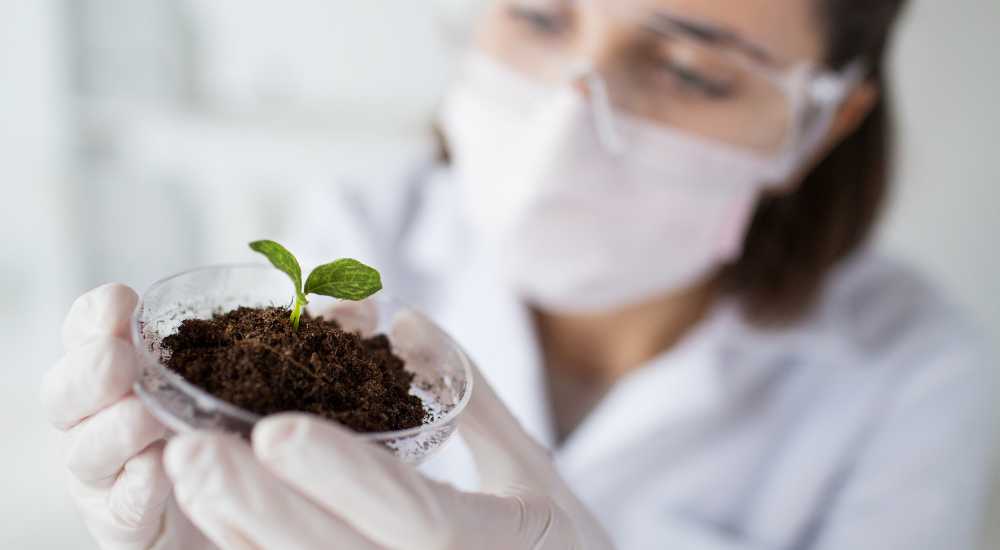Plant Scientist is a specialist who works to improve crop yields and advises food and crop developers about methods to improve production. Plant scientist is a more precise term than a botanist, which is more general. Any scientist who studies plants is called a botanist, while a plant scientist focuses on studying plants, trees, crops used in horticulture and agriculture, etc.
A plant scientist is responsible for enhancing the productivity of these plants, helping them breed, and protecting them from insects and pests to increase overall economic productivity. They come up with new technologies that boost output. Some of them research soil to increase crop productivity.
Some soil and plant scientists work in the field, while others experiment with new food processing methods in test kitchens. Soil and plant scientists work to boost the nation’s food production as the need and population rise by researching the qualities of crops that yield, how they grow in various soils, how to control pests and weeds, and the general chemical, biological, and physical makeup of the ground and plants.
What Does a Plant Scientist Do?
Soil and plant scientists study how soil composition impacts plant growth. They research plant breeding and cultivation and agricultural yields at the end of the growing season. They examine how different plant-growing methods, like genetic modification, affect the soil and crops.
Additionally, soil and plant scientists are in charge of examining contamination in soil and groundwater and developing new techniques to alter the contaminated area’s physical, chemical, or biological properties.
Scientists studying plants and soils use their research to advise farmers who grow food on how to manage their land and what crops are best suited to be produced on the ground. They conduct surveys on undeveloped land to help determine if it should be categorized as conservation land.
Land conservation programs and waste management measures for farms that include composting are supervised by soil and plant scientists. In order to grow various plant species in areas where they might not naturally occur, scientists also modify the types of soil used.
How to Become a Plant Scientist?
To make a career as a plant scientist, you must have a minimum of a bachelor’s degree in natural science. These degrees could be in chemistry, biology, or agriculture. Graduate-level education is required for many of these positions. For instance, a UG, PG, or Ph.D. are often necessary for jobs in the research sector.
While some roles for soil and plant scientists are entry-level, many businesses prefer individuals with at least five years of work experience. This is comparable to the medical field, where physicians and surgeons need to finish a four- to five-year residency in order to be qualified to practice.
Because there is little margin for error in these professions, many businesses in the scientific field want their staff to have as much education and experience as possible. Soil and plant scientists obtain considerable professional training, but most companies prefer to employ individuals they believe have a strong understanding of their profession’s duties and obligations.
Skills Required to Become a Plant Scientist
Soil and plant scientists should acquire an extensive skill set in science, writing, critical thinking, problem-solving, time management, and reading. They must be able to make informed decisions based on their knowledge and solve issues and respond to questions using logic and reasoning.
As plant scientists, individuals must be able to follow verbal instructions from superiors and other team members as well as mathematical formulas to solve their difficulties. They must be well-versed in various subjects, including biology, physics, chemistry, arithmetic, English, computers, and geography.
What is the workplace of a Plant Scientist like?
Depending on the sector they perform in, plant and soil scientists will have different working environments. Many individuals in the field of applied research put in regular work hours (9 to 5) in offices or laboratories.
Soil and plant scientists that work with foods could spend their working hours in kitchens where they test and create new food processing ways. For their studies on farms and other agricultural characteristics, scientists focusing solely on soil and crops will spend a lot of time outside collecting samples.
Many scientists collaborate in a team environment to develop new goods and procedures in their field while enhancing existing products.
Average Salary of a Plant Scientist
The average salary of plant scientists in India is 7,70,895, including a bonus of 12,334. The typical income for a plant scientist at the entry-level (with 1-3 years of experience) is ₹5,75,759. The average pay for a senior-level plant scientist (8+ years of experience) is ₹9,54,820.
